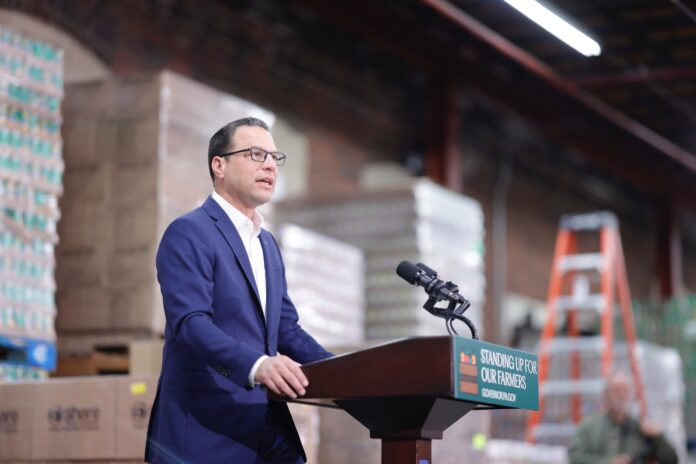
SALEM, Ohio — Vowing to defend Pennsylvania farmers while protecting food access for families in need, Pennsylvania Gov. Josh Shapiro announced on June 4 he is suing the U.S. Department of Agriculture over its abrupt cancellation of a $13 million program that supports nearly 200 Pennsylvania farms and supplies fresh local foods to food banks across the state.
The announcement came during a gathering at Philadelphia’s Share Food Program headquarters, which since 1986 has provided basic nutrition to the Philadelphia region’s most vulnerable families. Currently, the organization serves over 500,000 people each month, more than half of whom are children.
At the press conference, Share Food Program Executive Director George Matysik acknowledged the strain food banks are under, citing a staggering 120% rise in demand over the past three years. He sharply criticized the USDA’s decision to cancel the Local Food Purchasing Assistance Program, calling it “the outright breaking of a signed deal.”
“We had a signed deal. We had a deal with the federal government, President Trump. You had a deal with Pennsylvania farmers putting food on our tables,” Matisek said. “You had a deal with food banks serving 67 counties trying to alleviate poverty. And above all, Mr. President, you had a deal with the American people, and you broke your word.”
In his remarks, Shapiro said that at nearly every turn, Pennsylvania’s good faith efforts to resolve the funding issue were met with indifference. His administration attempted multiple times to reverse the USDA’s termination of the LFPA25 agreement, from filing an administrative appeal to contacting USDA Secretary Brooke Rollins and even traveling to Washington, D.C. to meet with agency leaders. But after those efforts were ignored, state officials say they were left with no choice but to file a lawsuit.
The suit was filed against the USDA, Rollins and the USDA’s Agricultural Marketing Service and argues that the USDA’s termination is “arbitrary and capricious and violates the regulations that the federal agency purported to follow.”
Recognizing producers that have supplied food banks statewide, Shapiro said it takes many partners “to make sure people don’t go to bed hungry.”
Administered by the state’s Department of Agriculture, the program funneled $28 million in federal funds directly to local farmers in exchange for produce, dairy products and meat delivered to food banks.
In December, the state had signed a three-year contract with the USDA, securing $13 million for Pennsylvania farms. But on March 7, the USDA under the Trump administration abruptly announced it would terminate the contract in 60 days, saying the program does not align with agency priorities.
Shapiro was blunt in his response.
“I don’t get what the hell their priorities are if not feeding people and taking care of our farmers,” he said.
He emphasized the human cost, noting that 189 farms were affected and that in southeastern Pennsylvania alone, the lost funds translated to 4.4 million meals that would no longer reach those in need.
“That’s not just bad policy — it’s a broken promise. A deal is a deal, and I’ve taken legal action today to ensure the federal government honors its commitment to Pennsylvania,” he said.
The USDA does not comment on pending litigation, referring questions to the Department of Justice, which declined to comment on the lawsuit.
Farmers speak out.
Farmers who benefited from the program also spoke, sharing personal experiences about the vital role it played, including Brian Campbell, a Columbia County farmer who began supplying fresh produce to food banks during the COVID-19 pandemic. He said that the experience has left him with a deep appreciation for what food insecurity truly means, whether someone is falling on hard times or simply less fortunate than others.
“Being able to provide food for the hungry is important, but even more impactful is the opportunity to change lives through health and nutrition. Programs that prioritize access to fresh fruits and vegetables for the food insecure are vital,” he said.
Campbell also stressed the importance of small but critical financial support to make the logistics of food delivery possible.
“(Programs like LFPA) allowed farmers to secure enough funding to cover the costs of harvest, packaging and transportation, critical steps that often prevent fresh produce from reaching the food banks, offering just enough support to make it feasible for farmers to help. And that
has made a difference. (I’m) looking forward to it coming back.”
Julie McCabe, of Pennypack Farm, a 13-acre vegetable farm in Montgomery County, described how the LFPA helped her organization expand its produce donation program from just over 8,000 pounds in 2017 to more than 26,000 pounds in 2024. She also emphasized the farm’s close relationship with local hunger relief groups, noting that in some cases, their farm is the only source of fresh produce those pantries receive.
“These programs don’t just feed people, they connect people. Public funding makes this all possible. It supports farms, reduces food waste and makes sure that everyone, no matter their income, has access to healthy, fresh-grown food right here in Pennsylvania,” she said.









